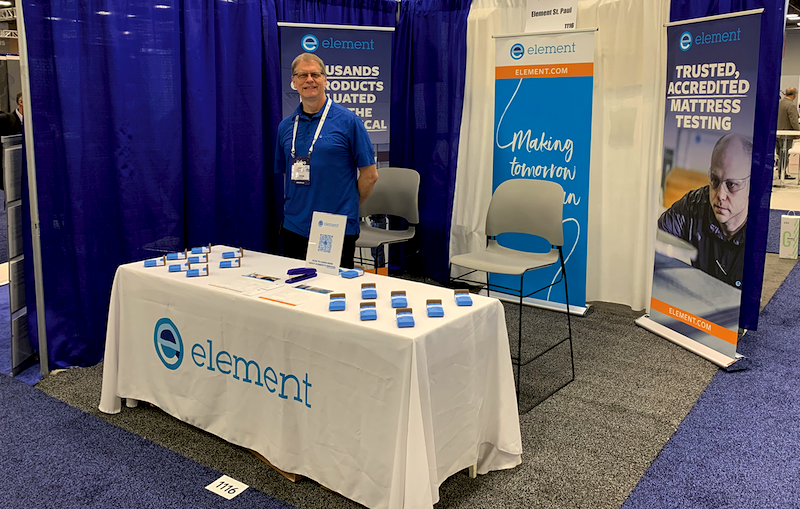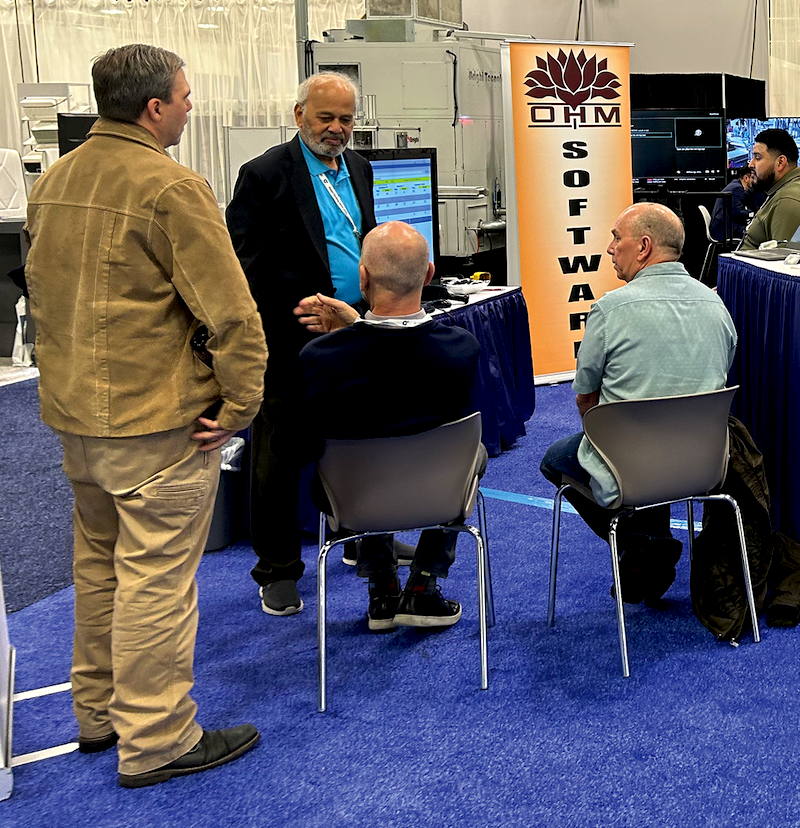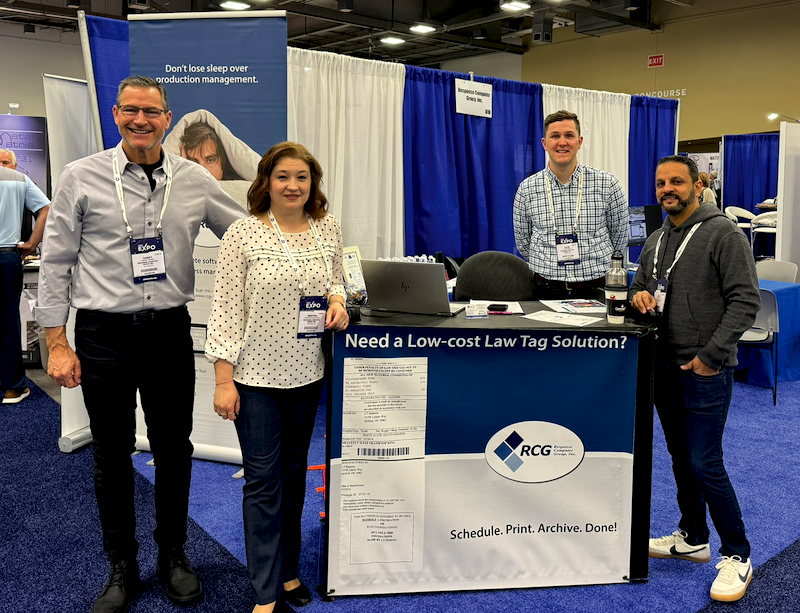How providers of transportation, law label, testing and other needed services
are adapting their offerings to meet manufacturers’ needs.
The suppliers of components that go into a mattress and the vendors of machinery that put those pieces together are vital to mattress producers’ success. But so are the companies that sometimes get less attention — the service providers that keep businesses running efficiently, ensure they comply with regulations, move goods from place to place and more.
These service providers say “service” isn’t just a designator of their role in the industry: It’s at the core of what they do.

“We go beyond what could be a transactional relationship and instead get to know each business and their unique situation, forming decades-long partnerships. Through our person-first approach, we learn the needs of companies and their teams,” says Deven Wisner, vice president of American Law Label Inc., based in Tucson, Arizona. “This typically extends beyond licensing and labeling, which positions our team to connect them with other trusted compliance resources.”
American Law Label designs and prints law labels for mattresses and other stuffed products but also offers law label audits, consulting and training. Through its sister company, Global Registration Services Inc., it provides uniform registration number verification and retail compliance for major retail partners.
BedTimes talked with several service providers to gauge how they are changing their business models to meet mattress manufacturers’ current needs and to learn what new services they are offering.
Beyond the Basics: The Expanding Role of Service Providers
Many service providers in the bedding industry strive to lift burdens off sleep products manufacturers by handling all aspects of a process or by offering a one-stop shop.
“Regulation has continued to get more complicated and layered — at a local, state and federal level. As a result, manufacturers have more compliance demands, which draws their attention away from areas of their business,” Wisner says. “Our team has responded by creating a start-to-finish process, where a manufacturer can get licensed and compliant labels delivered in one transaction, leaving them with more time to focus on other pressing needs.”

Artificial intelligence and other technologies can make doing business easier and faster but Brent Larson, a 31-year-veteran of the industry, says bedding producers still want direct contact with a human being, and they value his company’s personal touch.
“Customers appreciate talking to a real person versus a portal or a bot,” says Larson, department manager for Element St. Paul, part of Element’s global network of testing, inspection and certification facilities for a variety of industries. Element St. Paul provides a host of testing services to the mattress industry, including open-flame and cigarette flammability, hex roller/Cornell durability, pressure mapping, motion transfer, thermal performance/breathability and surface characterization.
Bedding producers may want the human touch, but they don’t have time to waste, wanting to get new products to market as quickly as possible.
“Customers are almost always on tight timelines,” Larson says. “Completing the testing and issuing reports in a timely manner is essential in today’s data-driven market.”
Catherine Anbil, executive vice president of Cincinnati-based OHM Systems Inc., which offers enterprise resource planning software and support, agrees that the mattress industry requires better responsiveness than ever before as players try to respond quickly to changes in the market. OHM customers seek “flexibility, timely responses and (the) quick ability to accommodate a swing in the industry with incorporation of processes and programs in the software,” she says.
Time has always been of the essence when it comes to transporting components and finished products.
“We are nimble and we embrace the technology of our customers to minimize paperwork and improve efficiency,” says Dianne Francin, vice president of sales and marketing for Cranston Trucking and Cranston Logistics, based in West Greenwich, Rhode Island. “We work with our customers’ needs, embracing their new software to fulfill the customers’ orders, using digital platforms to create bills of lading and dispatch the pick-ups for their product. All this ultimately saves time and money.”
Cranston specializes in less-than-truckload transportation, warehousing and truckload brokerage services with expedited delivery and dock-to-dock tracking. The company serves 48 U.S. states, as well as Canada and Mexico.
When times are difficult, customers often demand more from service providers — and times have definitely been difficult for the mattress industry lately.
“Business has been a bit tough the last couple of years for some of our partners and needs have definitely changed” says Wes Keever, president of Colonial LLC, a High Point, North Carolina-based company that provides display and branding solutions. It also has a third-party logistics division, K-5 Solutions, which provides warehousing, packaging, order fulfillment and light manufacturing for distributors, e-commerce companies and manufacturers.

“Colonial is always looking for a way to do something better and asking how we can help our partners be more efficient and effective with the products we make or distribute for them,” Keever says. “Whether that is streamlining logistics and distribution or designing products for better longevity on showroom floors, Colonial is always looking to be a good steward of our partners’ dollars, so they are able to get the most from their budgets.”
Service providers say they must be nimble enough to adapt not only to economic shifts but also to broader moves in the bedding market.
For instance, when consumers rushed to e-commerce sites to buy home furnishings at the start of the Covid-19 pandemic, OHM integrated “key software to accommodate more online sales and make the experience quicker and easier for the end user,” Anbil says.
Similarly, “when roll pack became more popular for direct shipping to the consumer, we added capability to print real-time UPS/FedEx labels directly from the shop floor. We have also added support for real-time production display on the shop floor,” says Randy Ennis, president and CEO of Response Computer Group Inc., based in Milford, Delaware. “The current trend is about improving shipping efficiency and optimizing the delivery schedule. We interface with several third-party products to provide this functionality.”
Response Computer Group offers a complete ERP system for large manufacturers, as well as “an entry-level system, LawTag ‘LT’ to smaller companies with lower-capacity needs,” Ennis says. “The entry-level solution includes law and bagger labels, scheduling, tracking, shop floor scanning and production display totals.” The complete ERP includes everything from accounting to order management to scheduling to quality control and more.
The Latest Trends in Mattress Industry Services
To meet the evolving needs of the bedding industry, in 2025, OHM plans to “continue to add technology and tools to further assist our clients in integrating with other sources and tools to empower their decision-making and to aid in the efficiency of their operations,” Anbil says.
Element St. Paul’s newest service is envelopment testing.
“This is a way to characterize the mattress surface for how well it conforms to the irregular shape of the human body,” Larson says. “When combined with pressure mapping, it gives a more robust picture of how well the mattress will support the body. In conjunction with hex roller durability testing, the envelopment test can help evaluate if the support properties of the mattress hold up over time.”
The medical mattress sector has used the test to help prevent pressure injuries, better known as bed sores. When envelopment testing is used for consumer bedding, “the primary goal is promoting a restful and restorative night’s sleep,” he adds.
Element St. Paul is also “strongly considering adding U.K./European mattress flammability tests to our offerings (e.g., EN 597-1 and -2),” Larson says.

When Utah announced plans in 2023 to require manufacturers and retailers to make the law labels on bedding, furniture and other stuffed items available to consumers online prior to purchase, American Law Label’s Global Registration Services unit worked with industry partners and state regulators to create its Law Label Lookup program.
“The program has been well-responded to and helped dozens of retailers and their vendors to simplify compliance with this new requirement by consolidating management of products and labels into a centralized location,” Wisner says. “The information is readily accessible to consumers and regulators through a simple link, as opposed to uploading copies of the label or text content to product description pages.”
BedTimes notes that Utah’s new online law label regulations took effect on Jan. 1, but the state later suspended them, and, in August, issued revised rules. The public comment period for the revisions was open until Oct. 15. The American Law Label/Global Registration Services team has been adapting as regulators reassess.
“As the online visibility rule evolves in Utah, our team is rolling out enhancements to Law Label Lookup that ensures our program remains accepted, while also easing the burden on retailers and their vendors,” Wisner says. “Our labeling team has (also) expanded our labels to include supplementary and complementary labels to law tags, including, but not limited to, tip over, flammability, Prop 65 and care instructions.”
In business since 1983, Response Computer Group routinely rolls out new products and services, Ennis says. In 2025, the company will offer cloud-hosted solutions that allow “for easier deployment, maintenance support, and lower pricing for the clients,” Ennis says. “(We’ll also be) enhancing our products to allow integration with other ERP/accounting systems for order import, BOM (bill of materials), inventory consumption, etc.”
For its part, Cranston “continues to grow as we continually exceed the needs of our customers,” Francin says. One way it has done that recently, she explains, is by embracing “leading-edge AI technology for select customers.”
“We are anticipating the demands of our customers for higher levels of accuracy,” she says.
In the coming year, Cranston plans to continue the expansion of its warehouse and distribution capacity and expects to bring new partners into its Partners in Excellence programs.
“We have found a niche for serving customers who want to bring their products from Europe for warehousing and distribution throughout the USA,” Francin adds.
To better serve its customers in new ways in recent years, Colonial created its logistics arm. “We actually set up … K-5 Solutions to help our partners streamline their logistics needs whether they are (for) Colonial-made products or not,” Keever says. “K-5 Solutions is there to do what is best for our partners.” For its display products, Colonial recently invested in a mobile-friendly online order portal and is “continuously updating this system based on feedback we receive,” Keever says. The company plans more upgrades in the coming year.
Regardless of their specific offerings, these suppliers say they’re committed to serving the bedding industry in the best ways that they can.
Read one of our latest features: Hospitality Mattress Market Trends: Why Hotels Are Turning to Bedding Manufacturers.




